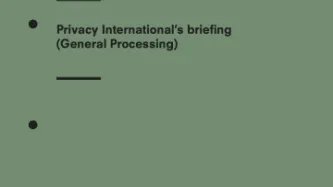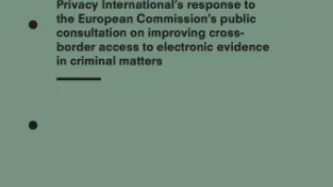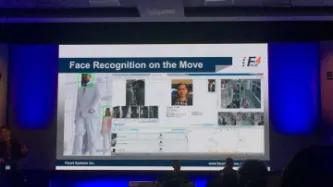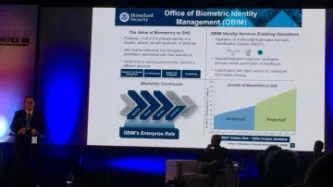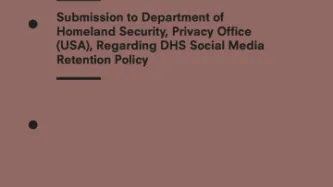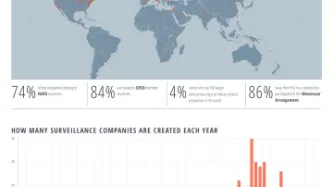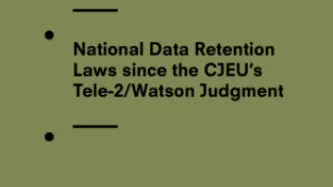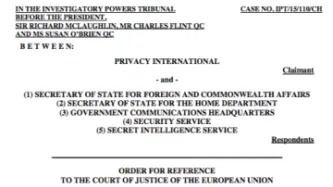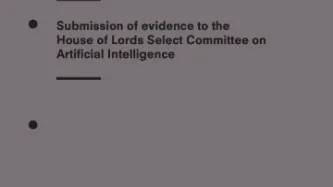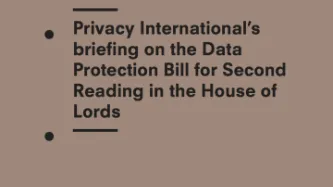Search
Content type: Press release
Privacy International has filed a federal lawsuit seeking to compel disclosure of records relating to a 1946 surveillance agreement between the US, UK, Australia, Canada and New Zealand, known as the “Five Eyes alliance”.* We are represented by Yale Law School’s Media Freedom and Information Access Clinic (MFIA). The most recent publicly available version of the Five Eyes surveillance agreement dates from 1955. Our complaint was filed before the U.S. District Court for the District of Columbia…
Content type: Legal Case Files
The complaints alleged that GCHQ had no clear authority under UK law to conduct hacking operations and that such activities violated the Computer Misuse Act 1990, which criminalises hacking. They further alleged that GCHQ hacking was in violation of Articles 8 and 10 of the European Convention on Human Rights, which respectively protect the right to privacy and the right to freedom of expression.
Content type: Report
The smart city market is booming. National and local governments all over the world expect their cities to become more efficient, more sustainable, cleaner and safer by integrating technology, increasing data generation and centralising data to provide better services. From large multinationals to small start-ups, companies want their slice of the multi-billion dollars per year pie of municipal budgets and long-term government contracts.
But do smart cities even exist? And are our cities…
Content type: News & Analysis
October 31st 2017 will mark the 3rd World Cities Day (we will forgive if you did not know that), with the general theme “Better City, Better Life.” On this date, PI will be launching its latest report “Smart Cities: Utopian Vision, Dystopian Reality”. This is an opportunity for us to ask: who exactly are our cities going to become better for?
Technology is often given as an answer when we are not sure what the question is. Cities are no exception to that. The current…
Content type: News & Analysis
Ask people around you if they live in a smart city, and more likely than not they will answer that they don’t. I can tell you that because I have tried.
When giving talks about this very topic in cities like Berlin, The Hague and Stockholm, I always ask this question at the start. The rough ratio I tend to get is that: 15 per cent hesitantly raise their hand to say they do, 60 per cent don’t, 20 per cent just look confused and 5 per cent are not listening.
And yet most people who live in cities…
Content type: Advocacy
Our full briefing is here.
Content type: People
Mahdis Keshavarz is a leading media and communications specialist, and an accomplished advocate of groundbreaking issues. She is an empowering and dynamic voice for the Middle Eastern community.She has placed thousands of news stories and op-eds with leading media outlets around the world – including front page stories in The New York Times, The Wall Street Journal, CNN, BBC, NPR, The National and Al Jazeera. Since 2013 she has produced TV segments for the BBC.…
Content type: People
Chris is responsible for our technical research on corporate exploitation, and leads our work on data exploitation in networks and infrastructure. He works within all facets of the organistation he helps to develop and maintain technological solutions to help us engage with the public and meet its strategic objectives. Christopher is a graduate from the University of Northampton with an honors bachelor degree in computer network engineering.
Content type: People
Gus has worked at the intersection of technology and human rights for over twenty-five years. He developed national, regional, and global campaigns on communications privacy. He worked on national security and anti-terrorism policy, and led global advocacy against border registration, biometric collection, tracking of migration, travel profiling, and mass surveillance of financial data flows. He led research and co-authored a book on identity systems and policy, Global Challenges for…
Content type: Long Read
Government hacking is unlike any other form of existing surveillance technique. Hacking is an attempt to understand a system better than it understands itself, and then nudging it to do what the hacker wants. Fundamentally speaking, hacking is therefore about causing technologies to act in a manner the manufacturer, owner or user did not intend or did not foresee.
Governments can wield this power remotely, surreptitiously, across jurisdictions, and at scale. A single hack can affect many…
Content type: Financial Report
Audited accounts for the year ending January 31 2017.
Content type: Advocacy
On 23 October 2017, Privacy International contributed to the public consultation of the European Commission on improving cross border access to electronic evidence for criminal investigation. The consultation raises important questions, particularly in relation to preserving human rights protection and safeguards as national police forces seek digital evidence in other jurisdictions.
The EU is not the only inter-governmental organisation seeking to address the complex jurisdictional…
Content type: News & Analysis
From unlocking a smartphone or getting through an airport, the use of an iris, fingerprint, or your face for identity verification is already widespread, and the market for it is set to rocket. While the technology is not new, its capability and uses are. As people, biometrics offers us much, but risks ultimately only serve data-hungry industries and government agencies: in the name of efficiency and security, it has the potential to bring chaos and vulnerability.
Obtaining reliable…
Content type: News & Analysis
The United States Department of Homeland Security (DHS) has contracted one of the world’s largest arms companies to manage a huge expansion of its biometric surveillance programme.
According to a presentation seen by Privacy International, the new system, known as Homeland Advanced Recognition Technology (HART), will scoop up a whopping 180 million new biometric transactions per year by 2022.
It will replace the Automated Biometric Identification System (IDENT), which currently stores…
Content type: News & Analysis
Privacy International’s Data Exploitation Programme Lead was invited to give evidence to the Select Committee on Artificial Intelligence at the U.K. House of Lords. The session sought to establish how personal data should be owned, managed, valued, and used for the benefit of society.
Link to the announcement of the session: https://www.parliament.uk/business/committees/committees-a-z/lords-select/ai-committee/news-parliament-2017/data-evidence-session/
Full video recording of the session:…
Content type: Advocacy
Privacy International wishes to raise serious concerns regarding the proposal to expand immigration records to include social media handles, associated identifiable information and search results. Specifically, in relation to the current request for comments Docket Number DHS 2017 0038, we object to the Department for Homeland Security proposal to update record source categories to include “publicly available information obtained from the internet”, “commercial data providers” and from “…
Content type: Explainer
What is SOCMINT?
Social media intelligence (SOCMINT) refers to the techniques and technologies that allow companies or governments to monitor social media networking sites (SNSs), such as Facebook or Twitter.
SOCMINT includes monitoring of content, such as messages or images posted, and other data, which is generated when someone uses a social media networking site. This information involves person-to-person, person-to-group, group-to-group, and includes interactions that are private and…
Content type: News & Analysis
Privacy International launches the Surveillance Industry Index & New Accompanying Report
Privacy International is today proud to release the Surveillance Industry Index (SII), the world's largest publicly available educational resource of data and documents of its kind on the surveillance industry, and an accompanying report charting the growth of the industry and its current reach.
The SII, which is based on data collected by journalists, activists, and researchers across the world…
Content type: Report
This report sheds light on the current state of affairs in data retention regulation across the EU post the Tele-2/Watson judgment. Privacy International has consulted with digital rights NGOs and industry from across the European Union to survey 21 national jurisdictions (Austria, Belgium, Bulgaria, Croatia, Cyprus, Czech Republic, France, Germany, Hungary, Ireland, Italy, Luxembourg, the Netherlands, Poland, Portugal, Romania, Slovakia, Slovenia, Spain, Sweden, and the United Kingdom).…
Content type: Press release
Key points
Privacy International surveyed 21 EU member states' legislation on data retention and examined their compliance with fundamental human rights standards
0 out of the 21 States examined by PI are currently in compliance with these standards (as interpreted in two landmark judgements by the Court of Justice of the European Union: Tele-2/Watson and Digital Rights Ireland)
Privacy International is calling for:
EU member states to review their legislation on data retention…
Content type: Press release
Privacy International, in partnership with 30+ national human rights organisations, has today written to national intelligence oversight bodies in over 40 countries seeking information on the intelligence sharing activities of their governments.
Countries may use secret intelligence sharing arrangements to circumvent international and domestic rules on direct surveillance. These arrangements can also lead to the exchange of information that can facilitate human rights abuses,…
Content type: News & Analysis
The short answer is yes.
I'm sure many of you have seen people with stickers over their webcams and wondered why (probably writing that person off as paranoid). But it's well known in tech circles that a camera in a computer or smartphone can be turned on remotely by an attacker with the resources, time, and motivation.
Security is hard, and our defences are weak. The capability of an adversary to attack your devices doesn't necessarily hinge upon a consumer choice of…
Content type: Advocacy
Privacy International has today submitted comments to a U.S. government consultation on whether the US Department of Homeland Security (DHS) should keep the social media details of individuals travelling to the US in so-called “Alien Files” documenting all immigrants.
We’ve urged that they don’t, and that they review and stop all similar social media surveillance by the DHS.
The systematic surveillance of social media is an increasingly dangerous trend …
Content type: Long Read
On 8 September 2017, the Investigatory Powers Tribunal decided to refer questions to the Court of Justice of the European Union (‘CJEU’) concerning the collection of bulk communications data (‘BCD’) by the Security Intelligence Agencies from mobile network operators.
The BCD regime was initially secret. In an earlier judgment, the Investigatory Powers Tribunal ruled that the regime was not compliant with the European Convention on Human Rights prior to its public avowal, but (subject to…
Content type: Advocacy
Privacy International's response to the inquiry by the House of Lords Select Committee on Artificial Intelligence.
Content type: Press release
While welcoming the objective of the Bill, Privacy International has sent a briefing to the House of Lords and a letter to Minister of State for Digital, Matt Hancock MP, outlining key concerns and recommendations. The Bill's stated aim is “to create a clear and coherent data protection regime”, and to update the UK data protection law, including by bringing the EU General Data Protection Regulation (GDPR) and the Data Protection Law Enforcement Directive (DPLED) - into the UK domestic system.…
Content type: News & Analysis
We found this image here.
On 11 October, the LIBE Committee of the European Parliament votes on the draft e-privacy regulation. As the landscape of generation, collection, and other processing of data in the digital sphere evolves, the proposal seeks to update the rules on confidentiality and security of electronic communications and online activities.
Unsurprisingly, companies whose business models rely on tracking individuals online have been busy lobbying against the new regulation. The…
Content type: Advocacy
Privacy International welcomes the aim of this Bill (Data Protection Bill), “to create a clear and coherent data protection regime”, and to update the UK data protection law, including by bringing the EU General Data Protection Regulation (GDPR) and the Data Protection Law Enforcement Directive (DPLED) - into the UK domestic system. This is Privacy International’s briefing on the Data Protection Bill for second reading in the House of Lords


